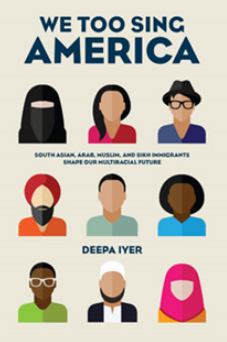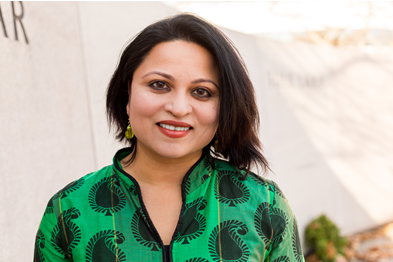
By Sid Sharma
@SidBSharma
Deepa Iyer has been a community organizer and activist since the late 1990s advancing causes such as racial and economic justice, voting rights, affirmative action and humane immigration policy. The aftermath of 9/11 compelled her to use her legal training to help those Americans (South Asian, Arab, Muslim and Sikh immigrants) unfairly targeted by the state and neighbors for suspicion of terrorism. She helped these communities assert their rights as Americans as executive director of South Asian Americans Leading Together (SAALT). Deepa is now a senior fellow at the Center for Social Inclusion. She also shares her experiences and helps train future generations at the Asian American Studies Program at the University of Maryland. Through it all she has worked to change a culture of hostility and suspicion into one that values justice and equity.
She has crafted a forceful and persuasive call to action in her new book, We Too Sing America. The book seeks to understand recent incidents of racial violence (the massacre of Sikh Americans in Oak Creek or Ferguson) within the larger context of race relations in an America that is undergoing a fundamental demographic transformation. Deepa argues that the possibilities of this new hopeful America can inspire South Asian, Arab, Muslim and Sikh communities to coalesce into heretofore unseen coalitions to create an inclusive nation with no more “others”.
I spoke to her to understand how this future can come about through organization and activism. Along the way, we spoke about the role of the Black Lives Matter movement, the divide between rich and poor Indian America and Bobby Jindal.
The best part is that you can also engage Deepa in person. She’s conducting a book tour through the country. But this is more than the typical excerpt reading exercise. Deepa will be interacting with actual activists across the country to shed light on the challenges people are facing as they relate to the themes of the book. Locations are available at www.Deepaiyer.com.
****
Sid Sharma: What made you want to write this book at this point in time?
Deepa Iyer: I think that we are at an important juncture when it comes to looking at race in America. As I noted in the book, our racial demographics are shifting rapidly and South Asian communities, in particular, are the fastest growing group in the United States. At the same time, we also have movements for and by communities of color on the rise. Whether it’s movement for Black rights or whether it’s the movement of undocumented youths around immigration and immigrant rights. Thirdly, we also have a trend in this country towards racial anxiety, xenophobia, national insecurity, Islamophobia that is getting louder and louder. I felt like this book would be an important entry point to having a discussion about those three different forces in the United States and how people of color and immigrants can actively engage those issues.
SS: You mention a political coalition in this book called AMEMSA (Arab, Middle Eastern, Muslim and South Asian). What defines it and keeps it together?
Deepa: The AMEMSA identity is something that really came together after 9/11 to bring these communities together that were being targeted in the same way by government policies because they were seen as potential terrorists. Because of policies like the Patriot Act and many others, surveillance ended up impacting these communities in the same way. The identity was a way for people to come together to say, “We are kind of in this together, we’re being affected in the same way and it’s important that we build a coalition to address some of these ways in which we’re being targeted.”
SS: Is there a divide between rich AMEMSA and poor AMEMSA? We see the South Asian Silicon Valley CEOs and then there are people that are washing the dishes in restaurants.
Deepa: I think class is a divider. For example, within the Indian community there is a large range of people in different socio-economic circumstances. We hear that Indian Americans are successful economically but we often don’t hear about Indian American who are struggling, who are on the margin. Undocumented Indians are the fourth largest undocumented population in the country. If you’re undocumented, you’re immediately without benefits and a range of protections and you’re not necessarily feeling safe all the time either.
We need to be really conscious of how we divide among ourselves. Part of that includes declining the so-called racial bribe; to not give in to this invitation to be seen as an honorary White. It’s important to not give into the 
SS: The next question I have is actually about racial bribery. In the south, we see Indian American Governors like Bobby Jindal and Nikki Haley. Is their success based on something like a racial bribery or is it something different?
Deepa: I can’t speak to how they see themselves racially. But what we do know about Bobby Jindal, in particular, is that he has tended to talk in rather demeaning ways about new immigrants, the need for people to assimilate and to give up their identity in order to be called Americans. He has made a lot of anti-Muslim comments. Certainly, that sort of rhetoric positions people against each other.
It’s important for South Asians to realize that in many ways we’re marginalized in society and that we’ve always been part of this “other”. The racial bribes might allow us to think that we’re moving up but that’s kind of a holographic reality; it’s not actually real. I’m hoping that the folks that are new to the debate will really start to think about the ways in which they might be presented with racial bribes every single day.
SS: What lessons do the Black protests for equal treatment have for Asian American activism?
Deepa: The movement for Black rights has opened up tremendous opportunities for communities of color including South Asians and Asian Americans to actually have conversations about race and racism. I think we should take advantage of that opportunity as much as we can. Part of it is understanding the ways in which policies and systems have really been focused on perpetuating anti-Black racism and how African American communities have been impacted by those policies and laws. Whether that’s in a criminal justice context, a housing context, or education context, we really understand the roots and forms of anti-black racism.
We also need to have a conversation around the commonalities that unite people of color. One example of something that I see many South Asian activists do recently is talk to their communities about criminal justice and police brutality by using the case of Sureshbhai Patel (the Indian grandfather who was assaulted in Alabama earlier this year). Why are Black people being targeted in this way and why was Sureshbhai Patel targeted?
SS: If I were a young person today from the communities that you’ve discussed, what is the best way for me to make the most positive impact possible?
Deepa: Young people are more open to seeing these demographic changes as being something that’s very normal and not something that is abrupt or necessarily negative. They have the chance to come together, to organize, to raise their voices and say, “We are part of the re-shaping of this country and won’t be marginalized.”
Taking that power and owning it is vital. I don’t think that it can happen without support and without all of us helping to create communities where young people feel safe enough to take those steps. This is especially the case for young people who are undocumented, working class, who are Muslims or Sikh. For those of us who may have other forms of privilege, we have to take responsibility for supporting these young folks so that they can actually raise their voices and feel safe.

